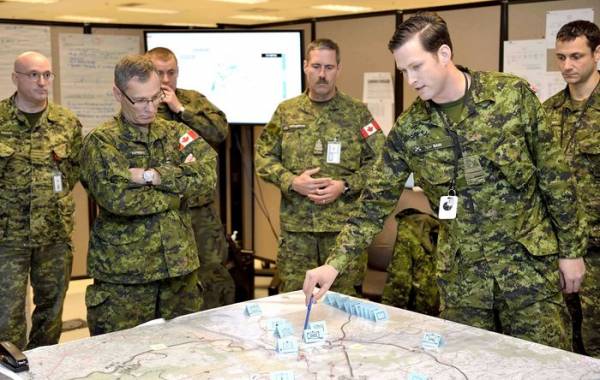
In this new CDA Institute Analysis, David Last examines the role of professional executives – including military and civilian – and security education in the formulation and debate on Canadian national strategy. The following is an excerpt of the Analysis.
Russian hybrid warfare threatens the Ukraine. The Shanghai Cooperation Organization is deepening. NATO is divided about exercises to bolster the Baltic republics. Libya hasn’t stabilized since NATO bombing. More than a decade of investment in Iraq and Afghanistan looks unlikely to pay off with peace. American leadership in the Middle East seems to be faltering as Washington itself faces gridlock and domestic protest. Future American leadership is uncertain, with populist revolts undermining traditional political parties. Angry and fearful citizens voted to take Britain out of Europe, almost to their own surprise, and Scotland and Northern Ireland might not want to go. Canadians seem equally fascinated and appalled by turns. The Trudeau honeymoon is waning, and the Defence Policy Review is unlikely to produce anything approaching a consensus.
Who will speak to policy choices if military executives are unable to explain and debate in public? We are like rabbits in the headlights, scatter-brained squirrels, or old dogs barely raising an ear to the din. Everything is new and shocking, paralyzing our actions, or everything is urgent and requires immediate response? Or it is all the same old story, and nothing new is needed? Where are the strategic leaders and deep thinkers who will chart the course through the apparently new and dramatic changes in our security environment? Who will clarify policy choices and their consequences? Two recent contributions to the CDA Institute Analysis series from veteran campaigners provide a framework for coherent national strategy and a warning about the pitfalls of past reviews. These are good starting points for thought, but won’t produce a substantive debate based on knowledge to which many are not privy.
In this brief I will discuss the concept of professional executives, security education, and national strategy, concluding with a call for the executive equivalent of academic freedom. Canadian Generals and Deputy Ministers don’t write much in public. Political leaders and the policy establishment would benefit from more debate in the open. Let the security executives speak with their own voices and knowledge, so Canadians understand our options. Executives who communicate effectively to the public will help to build a policy consensus that serves social cohesion, human, national, and international security. Political leadership can set the boundaries of that debate.
Security and Military Executives
Defence departments and military forces don’t have a monopoly on security issues, but defence policy tends inappropriately to monopolize discussions of security. This is true even in Canada, where defence is traditionally not a senior ministry. Canada doesn’t appreciate big personalities in its Generals. John de Chastelaine was a throwback to an earlier era. Rick Hillier and Walt Natynczyk were socialized by their American experience, and are liked or disliked for it. The Canadian norm is less colourful. Who remembers the yeoman service of John Anderson, Maurice Baril, or Ray Henault? This should make it easier for civilian executives to contribute to the security and strategy debate in Canada.
Military and civilian executives have different expertise. From the trenches of the middling but experienced military staff, prompted by the push of professionalism and the pull of intermittent senior leader interest, we have endlessly studied leadership, its demands, and its requirements. The interest from senior leaders has been intermittent because the demands on them have been relentless and often well beyond the scope of their preparation for the positions in which they find themselves. Interviews with senior officers suggest that they have often felt unprepared for their roles in senior management. Civilian executives can sympathize on matters of strategy and security, but may be ahead of Generals on finance and management, so they should be part of the same conversation on security, and together might draw from a deeper well of professional and leadership knowledge that is both civil and military.
In common with military forces around the world, Canada’s officers are part of an inverted profession. They begin as specialists – Army, Navy, or Air Force, operators, logisticians, communicators, and others. As they progress through their professional mid-career and senior officer education, they learn to integrate those specialties and eventually, as effective generalists, they become Generals or Admirals. Are they up to the task of guiding the institution, developing coherent strategy, and advising political leaders? Can they integrate the prudence and wisdom needed to achieve human, national, and international security in chaotic and changing times? Society needs them to test their intellectual depth and agility in a wider marketplace of ideas as they rise to positions of leadership.
Security professionals in any country are part of a system of competing professions making plausible claims to contribute to security: international security through expeditions, national security through police and public safety, or human security through health and welfare. With the shadows of big wars in our collective memory, military education gives inadequate attention to integrating non-military dimensions of security. By making a strong case to militarize problems, we sometimes apply inappropriate instruments. The separation of military and non-military expertise, and the competition between professional groups representing different interests are an inevitable consequence of social organization, but also reflects fragmented departmental mandates. Even without conflating ministry mandates, accessible forums for debate can help to make professional competition more useful to society.
Click here to read the rest of the CDA Institute Analysis.
Dr. David Last is an associate professor of political science at the Royal Military College of Canada. (Image courtesy of National Defence and the Canadian Armed Forces.)